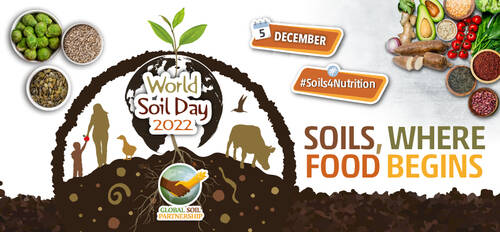December 5, 2022

by Dan Hovland, Acting State Conservationist
Soil is a vital natural resource that the entire world depends on for food, fuel and fiber. Without a fully functioning soil health system on farms here in Indiana and throughout the world, we cannot hope to produce the materials the world’s growing population needs to survive.
According to the Food and Agriculture Organization of the United Nations, 95% of the food the world consumes is grown directly in the soil by the world’s farmers.
That is why for this year’s World Soil Day, which is celebrated annually on Dec. 5, the FAO has chosen “Soil, where food begins,” as the theme.
Soil is a precious resource, and it will take a team effort to ensure it is protected and viable for years to come. Indiana farmers are already at the forefront of these efforts and are some of the nation’s leading adopters of cover crops, no-till farming and other soil health practices that are unlocking the secrets of the soil. We must continue to build on these successes on farms of all sizes.
Over the last few years, multiple global events have laid bare the struggle with food insecurity many face worldwide and in our own Indiana communities. The typical farms throughout Indiana have been playing a leadership role in addressing this issue for years, with over 1.5 million acres of cropland managed in soil health management systems annually, to produce our corn and soybean crops. Small-scale and urban farms also play a role to directly feed their communities. Farms like Teter Organic Farm in Noblesville, Indiana, for example, grew more than 20,000 servings of food for Hamilton County food banks in 2022, or Unity Gardens in South Bend, which is made up of a collection of community gardens that provide food to the homeless population in St. Joseph County.
Regardless of the size of farm or the crops that are grown, reliance on healthy soil and the importance of soil health practices can help any farmer be successful.
USDA’s Natural Resources Conservation Service (NRCS) is committed to working with farms of all sizes to help build their soil health and implement soil health practices. Here are a few steps you can take to help ensure you are building a resilient soil health system that will help your farm:
- Plant cover crops in between cash crop growing seasons. Keeping living roots in your soil year-round feeds the microscopic world that creates a living soil. Cover crops can also help to cycle nutrients back into your soil. Keeping your fields covered in fallow seasons can also reduce erosion, keeping your valuable soil resources on your field.
- Reduce tillage. Even if you are not ready to fully commit to no-till farming, reducing tillage can have drastic positive impacts on your soil by increasing drainage potential, reducing compaction and keeping the soil profile intact. It can also save you money on fuel by limiting the passes you make in the field.
- Rotate your crops. Crop rotation is a key factor in breaking the disease and pest cycle in your fields. It can also help to improve the level of nutrients in your field by varying which nutrient the crop is dependent on each season and provide more diversity on your farm.
NRCS has financial assistance available to help farmers implement soil health practices including cover crops, no-till and crop rotations. NRCS also offers free technical assistance to help farmers learn more about soil health. Farmers who are interested in implementing any of these practices, or learning more about how to start a soil health journey, can contact their local NRCS district conservationist at https://www.nrcs.usda.gov/contact/find-a-service-center.
Soil health isn’t achieved overnight. It takes patience, fortitude and a system of practices working together to produce healthy, fully functioning soils. Indiana NRCS is committed to helping farmers every step along the way and there is no better day to start than World Soil Day.
About NRCS:
USDA’s Natural Resources Conservation Service helps America’s farmers conserve the nation’s soil, water, air and other natural resources. All programs are voluntary and offer science-based solutions that benefit both the landowner and the environment. To learn more about NRCS and what we do go visit www.nrcs.usda.gov/indiana Follow us on https://twitter.com/IndianaNRCS.